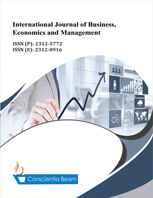The Transitional Relationship between Economic Growth and Exchange Rate in Ghana: An Empirical Approach
DOI:
https://doi.org/10.18488/journal.62.2019.63.174.185Abstract
The motivation behind this study was to investigate empirically the transitional relationship between economic growth and the exchange rate in Ghana, viz, to what extent and magnitude does the exchange rate affect economic growth? The variables incorporated in the study were interest rate, inflation and direct foreign investment. The statistical results using the Phillips-Perron (PP) test of stationary disclosed that the variables were integrated in order of I(1) and I(0). Johansen cointegration (maximum eigenvalues) established the existence of at least two cointegration vectors and long-run relationships between the variables in the model. The output from the long and short-run estimates revealed the exchange rate to have a robust significant relationship with economic growth. It was recommended that government should embark on rigorous domestic economic transformation (monetary policies, infrastructure repositioning, adequate security etc.) as well as external export promotions to strengthen the economic fundamentals so as to attract foreign investment into the economy. It was also recommended that the Bank of Ghana should pay particular attention to inflation and interest rate volatilities to ensure and embed consumer and producer confidence.

